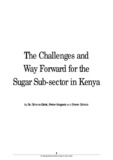| dc.description.abstract | Sugar is a political as well as a strategic commodity. The sugar sub-sector is a
source of livelihood to over one million people in Kenya. It offers employment and
helps in rural infrastructural development. It is a commodity that faces competition
from imported sugar under the COMESA protocol or from the residual world market.
The cost of production in Kenya is high when compared to other regional producers
and world market prices, which – for political reasons – are lower than the production
costs in any sugar producing country. The milling firms in Kenya are riddled with a
heavy debt burden. The cane yield per hectare in Kenya does not compare well
with global trends. In order to deliberate on the challenges facing the sugar sub-
sector, Honourable Members of Parliament from the sugar belt and Directors of
Kenya Sugar Board were facilitated by the Friedrich Ebert Foundation to attend a
workshop at Mombasa on 4th– 5th July 2003.
The aim of the workshop was to identify the problems facing the sugar sub-sector
and to come up with recommendation on the way forward. This report is written
in a book format for ease of reading and to avoid the monotony of reproducing the
papers presented in a verbatim format. The aim is also to produce the results of
the workshop in an easy to read format where the main points are easily discernible.
Members of Parliament have been at the forefront in urging for the revival of the
sugar sub-sector. It was through their efforts that The Sugar Act, 2001 was passed.
It is due to their interest in having the country deal with the challenges afflicting
the sub-sector that the Friedrich Ebert Foundation was only too glad to organize a
meeting for them to critically discuss the challenges for the sector. First, we thank
the Honourable Members of Parliament from the sugar belt and the Directors of
the Kenya Sugar Board for agreeing to leave their busy schedules to deliberate on
issues affecting this important sub-sector of the Kenyan economy. We are also
grateful to The Minister for Agriculture, Honourable Kipruto Arap Kirwa for The Challenges and Way Forward for the Sugar Sub-sector in Kenya
6
participating at the deliberations and officially closing the session. We are also
grateful to The Chair of the Sugar Parliamentary Group Hon Soita Shitanda and
Hon Dr Noah Wekesa the chair of the Departmental Committee on Agriculture for
their contributions and attendance. Honourable Wycliffe Osundwa played a key
role in the conceptualization and organization of this meeting together with my
Colleague Collins Odote. I thank them for this. Our gratitude also go to the key
resource persons at the meeting Dr Otieno Odek, Peter Kegode and Shem Ochola
for not only making excellent presentations but also for preparing this report. Lastly
I thank Dr Paul Goodison for also making a presentation at the workshop on the
impact of international trade regimes like WTO and COTONOU on the sugar sector
in Kenya.
It is our hope that some of the recommendations made at the workshop will be
implemented to revamp and resuscitate the sugar industry in Kenya. | en |

